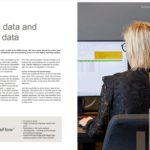Life Cycle Assessment (LCA) and product carbon footprint reporting are essential tools for organizations looking to measure and reduce their environmental impact. However, the validity and reliability of these reports are critical to their effectiveness. To ensure transparency and accuracy, third-party verification is essential.
Third party verification
Third-party verification involves independent organizations assessing the accuracy and completeness of LCA and product carbon footprint reports. It provides an additional layer of assurance that the reported data is reliable, complete, and accurate. Third-party verification can also help to identify areas for improvement and provide recommendations for further action.
Verification is essential for organizations looking to demonstrate their commitment to sustainability. It enables organizations to communicate their environmental impact accurately and transparently, which can help to build trust with stakeholders, including customers, investors, and regulators. Additionally, third-party verification can help organizations to identify opportunities for improvement, reduce costs, and enhance their reputation.
Third-party validation of LCA and product carbon footprint reporting is critical in many industries, including the food and beverage, automotive, and energy sectors. In the food and beverage industry, for example, third-party verification of LCA reports can provide assurance that products have been sustainably produced, promoting ethical and responsible sourcing practices.
Regulations and ISO standards
The importance of third-party validation of LCA and product carbon footprint reporting is also recognized by regulatory bodies, such as the International Organization for Standardization (ISO). The ISO 14044 standard requires the use of third-party verification for LCA reports to ensure their validity and reliability.
Third-party validation of LCA and product carbon footprint reporting is essential for organizations looking to demonstrate their commitment to sustainability. Verification provides assurance that reported data is accurate, complete, and reliable, which can help to build trust with stakeholders and promote sustainable practices. By adhering to standards such as ISO 14044, organizations can ensure the validity and reliability of their LCA reports and product carbon footprint data. Investing in third-party verification can provide significant benefits, including improved reputation, reduced costs, and enhanced sustainability performance.
ReFlow’s LCA-based platform is also based on the ISO standards 14044 and 14040 to ensure reliability. New features have just been added to the platform to make it even easier to ensure the quality and validity on calculations. The newest Quality, Validity and Transparency functionalities make it possible to get a quality and validity score based on how your data is sourced (custom or primary data from suppliers score higher) and if that data has been validated by a third party. Additionally, with the transparency feature, you can now get an overview of all your calculations’ data source information such as its origin, quality, validity and background data.
Want to know more about your organisation can use the ReFlow platform ?
Contact us to learn more or book a demo.








